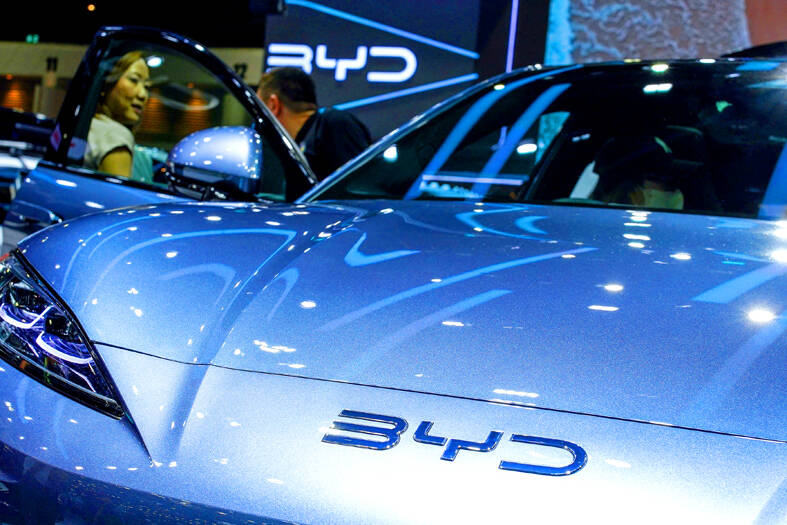Shares in Chinese electric vehicle (EV) giant BYD Co (比亞迪) surged to a record high yesterday after it unveiled new battery technology that it says can charge a vehicle in the same time it takes to fill up a car with gasoline.
The company said the battery and charging system, called “Super e-Platform,” boasted peak speeds of 1,000 kilowatts, allowing cars to travel up to 470km after being plugged in for just five minutes.
The new technology aims to “fundamentally solve users’ charging anxiety,” BYD founder Wang Chuanfu (王傳福) said.

Photo: Reuters
“Our pursuit is to make the charging time of electric vehicles as short as the refueling time of fuel vehicles,” he said at a launch event on Monday evening.
BYD’s Hong Kong-listed shares jumped more than 6 percent to hit a fresh peak at one point yesterday morning before paring some of the gains.
The announcement positions BYD ahead of archrival Tesla Inc, whose Superchargers currently offer charging speeds of 500 kilowatts.
BYD introduced the Super e-Platform alongside two new EV models that are the first to feature the system — the Han L sedan and the Tang L sports utility vehicle.
The Shenzhen-based company also unveiled plans to build more than 4,000 ultra-fast charging stations nationwide to support the new technology.
BYD’s ambitious expansion comes on the heels of remarkable growth, with sales last month soaring 161 percent to more than 318,000 EVs, while Tesla experienced a steep 49 percent sales decline in the Chinese market during the same period.
Separately yesterday, Chinese EV maker Nio Inc (蔚來) said it had signed a deal with battery giant Contemporary Amperex Technology Co (CATL, 寧德時代新) involving cooperation on a passenger car battery swap network.
Battery swapping offers an alternative to ultra-fast charging for vehicle owners worried about range, although the vast infrastructure required and standardization issues present major hurdles.
The new cooperation would see CATL invest a maximum of 2.5 billion yuan (US$346 million) in Nio’s battery swap network.

IN THE AIR: While most companies said they were committed to North American operations, some added that production and costs would depend on the outcome of a US trade probe Leading local contract electronics makers Wistron Corp (緯創), Quanta Computer Inc (廣達), Inventec Corp (英業達) and Compal Electronics Inc (仁寶) are to maintain their North American expansion plans, despite Washington’s 20 percent tariff on Taiwanese goods. Wistron said it has long maintained a presence in the US, while distributing production across Taiwan, North America, Southeast Asia and Europe. The company is in talks with customers to align capacity with their site preferences, a company official told the Taipei Times by telephone on Friday. The company is still in talks with clients over who would bear the tariff costs, with the outcome pending further

A proposed 100 percent tariff on chip imports announced by US President Donald Trump could shift more of Taiwan’s semiconductor production overseas, a Taiwan Institute of Economic Research (TIER) researcher said yesterday. Trump’s tariff policy will accelerate the global semiconductor industry’s pace to establish roots in the US, leading to higher supply chain costs and ultimately raising prices of consumer electronics and creating uncertainty for future market demand, Arisa Liu (劉佩真) at the institute’s Taiwan Industry Economics Database said in a telephone interview. Trump’s move signals his intention to "restore the glory of the US semiconductor industry," Liu noted, saying that

NEGOTIATIONS: Semiconductors play an outsized role in Taiwan’s industrial and economic development and are a major driver of the Taiwan-US trade imbalance With US President Donald Trump threatening to impose tariffs on semiconductors, Taiwan is expected to face a significant challenge, as information and communications technology (ICT) products account for more than 70 percent of its exports to the US, Chung-Hua Institution for Economic Research (CIER, 中華經濟研究院) president Lien Hsien-ming (連賢明) said on Friday. Compared with other countries, semiconductors play a disproportionately large role in Taiwan’s industrial and economic development, Lien said. As the sixth-largest contributor to the US trade deficit, Taiwan recorded a US$73.9 billion trade surplus with the US last year — up from US$47.8 billion in 2023 — driven by strong

STILL UNCLEAR: Several aspects of the policy still need to be clarified, such as whether the exemptions would expand to related products, PwC Taiwan warned The TAIEX surged yesterday, led by gains in Taiwan Semiconductor Manufacturing Co (TSMC, 台積電), after US President Donald Trump announced a sweeping 100 percent tariff on imported semiconductors — while exempting companies operating or building plants in the US, which includes TSMC. The benchmark index jumped 556.41 points, or 2.37 percent, to close at 24,003.77, breaching the 24,000-point level and hitting its highest close this year, Taiwan Stock Exchange (TWSE) data showed. TSMC rose NT$55, or 4.89 percent, to close at a record NT$1,180, as the company is already investing heavily in a multibillion-dollar plant in Arizona that led investors to assume